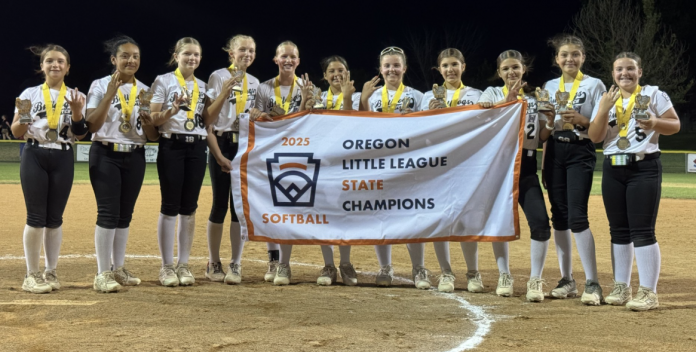UPDATE: Oregon AG sues Morrow County officials, Rep. Smith for $6.9M
Published 6:00 am Thursday, July 17, 2025

- Rep. Greg Smith, R-Heppner, left, and Dan Rayfield, Democratic candidate for Oregon attorney general, listen June 19, 2024, as audience members bring up their concerns in a meeting in Hermiston. Rayfield, Oregon attorney general, filed a civil suit against Smith and others July 15, 2025, claiming they used insider knowledge to purchase a company. (Tori Schuller/East Oregonian, Archive)
Smith contends as disinterested board member he gained nothing from sale of Windwave
SALEM — Oregon Attorney General Dan Rayfield has filed a $6.9 million lawsuit against former Morrow County elected officials and community leaders as well as state Rep. Greg Smith, R-Heppner.
Rayfield filed the suit July 15 in Morrow County Circuit Court. The pleading claims “insiders” used knowledge they had from their positions in the community and company to buy the broadband subsidiary of a nonprofit for personal profit.
The lawsuit names Jerry Healy, Marvin Padberg, Gary Neal, Don Russell, Blake Lawrence, Jill Parker, Richard Devin, Smith, Windwave Technologies Inc., WW Technologies LLC and Inland Development Corp. as the defendants.
Trending
Rayfield’s lawsuit specifies Healy, Padberg, Neal, Russell and Lawrence orchestrated the purchase of the broadband company Windwave Technologies from Inland Development Corp., an Oregon nonprofit “created to provide internet services to rural school districts, hospitals, libraries and courthouses.”
Healy was a Port of Morrow commissioner from July 1993 until August 2023. Padberg was a Port of Morrow commissioner from at least 2013 until June 2023. Russell was a Morrow County commissioner 2015 through 2022. Neal worked as the general manager of the Port of Morrow from at least 1989 until 2018. Lawrence became Windwave’s CEO in March 2017 and has worked as Inland’s executive director since 2017.
The five also serve on the boards of directors for Inland or Windwave or both.
The insiders, according to the lawsuit, recruited Smith, Parker and Devin to serve as “disinterested directors” to approve Inland’s sale of Windwave to the Insiders.
The group purchased Windwave Technologies in May 2018. Today, Windwave runs approximately 1,000 miles of broadband fiber across Eastern Oregon.
About the damages
According to a press release announcing the suit, the Oregon Department of Justice is seeking damages of at least $6.9 million or “for the sale of Windwave to be voided, for an injunction and for other remedies to ensure accountability and to safeguard the principle that nonprofit resources created for public benefit must not be converted into private profit.”
Trending
Windwave was a for-profit subsidiary of Inland, and Rayfield’s suit claims the purchase was “based on confidential, non-public information.”
The defendants’ purchase price for Windwave — $2.614 million — was lower than it should’ve been, Rayfield claims, because its evaluation from 2017 didn’t include the opportunities associated with Amazon Web Services locations being established in the county, which the purchasers knew about.
The data centers Amazon built — and that Port of Morrow approved under Neal — were a boon for Windwave. Yet the defendants, the lawsuit states, failed to disclose the increased financial value of the company.
According to the suit, Smith, Parker and Devin on Inland’s board of directors “relied entirely upon information and analysis that was produced or managed by the insiders” in their vote approving the purchase, “despite knowing that the transaction was subject to numerous conflicts of interest.”
Rayfield’s suit states the conflicts should have indicated a need for independent analysis. Instead, in April 2018, the directors approved the sale.
The next month, the insiders purchased Windwave for “at least $6.9 million less than its actual value based on information known to the insiders as of the date of sale.” The suit does not say how the plaintiff determined Windwave’s supposed value of $9.5 million at the time.
Smith responds
In an email, Smith stated he and other disinterested replacement board members are defendants in the lawsuit because the attorney general “argues we should have been more diligent in seeking a higher sales price.”
But Smith contended he has no personal or financial stake in the deal.
“I do not own a single share of Windwave stock. I have never received any funds from Windwave. Inland Development has never given me so much as a ham sandwich.”
Smith also explained as an unpaid board member why he voted for the sale of Inland assets to Windwave.
“First, I believed the sale proceeds would be dispersed to local students in the form of scholarships,” he said, which has happened. Inland Development reported it awarded 27 scholarships in 2025 totalling $54,000.
Second, Smith said, the Oregon appraisal firm Cogence Group PC provided Inland Development an appraisal with a financial value equal to the sales price.
“This means Inland Development received the cash equivalent of the assets sold to Windwave,” Smith said.
Lastly, on April 27, 2018, after months of review and working closely with the Oregon Department of Justice, Attorney General Ellen Rosenblum issued a letter to the board of Inland Development telling us she “had no objection to the proposed transfer” and thanked us for “bringing the matter to her attention.”
“This was the selling point for my vote,” Smith said.
Claims of duty
The suit also claims the defendants failed in their fiduciary duty to Inland in charging higher prices after just one year for Windwave’s services than the agreed upon $200,000 for the first five years as part of the company’s sale. Inland’s IRS return showed payments to Windwave of $350,000 — 1.5 times as much as the sale outlined.
All of the defendants breached these duties, claims the filing.
“The insider sale of Windwave not only diverted public value into private hands but potentially undermined the long-term availability of affordable broadband for these essential services,” said the Department of Justice.
In all, the state offered seven claims for relief to justify the request for at least $6.9 million. If the court doesn’t award damages, the state asks Windwave’s sale to the defendants be voided, coverage for costs of attorney fees and that the court prevents the defendants from acting on behalf of any charitable organization or handling any money or financial matters for a charitable organization moving forward.









